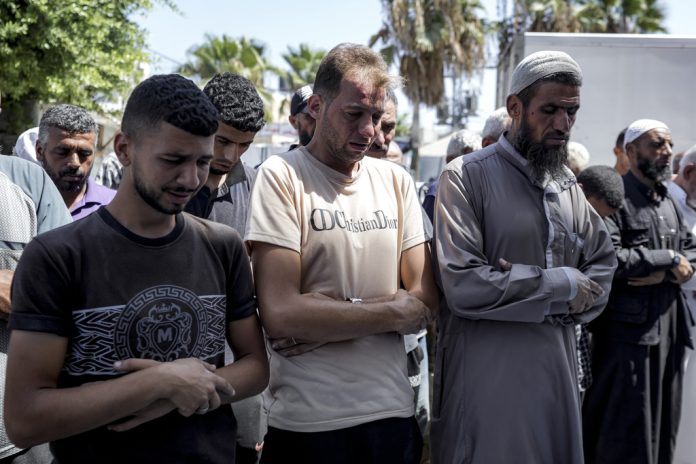Palestinian health officials say Israeli strikes across the Gaza Strip overnight and into Wednesday killed at least 17 people, including five children and their parents.
The latest strikes came on the eve of new talks aimed at reaching a cease-fire in the 10-month-long war. The United States, Qatar and Egypt are hoping to broker an agreement, but the sides remain far apart on several issues even after months of indirect negotiations.
One strike hit a family home late Tuesday in the built-up Nuseirat refugee camp in central Gaza, which dates back to the 1948 war surrounding Israel’s creation. It killed five children, ranging in age from 2 to 11, and their parents, according to the nearby Al-Aqsa Martyrs Hospital.
An Associated Press reporter who saw the bodies arrive said they had been dismembered by the blast and that the 2-year-old had been decapitated.
In the nearby Maghazi refugee camp, a strike on a home early Wednesday killed four people and wounded others, the hospital said.
In the southern city of Khan Younis, the Health Ministry’s emergency service said first responders recovered the bodies of four men who were killed in a strike on a residential tower late Tuesday.
Two more people were killed in an Israeli strike on a house in the northern town of Beit Lahiya, according to the emergency service. The strike also wounded five people.
Health authorities in Gaza do not say whether those killed in Israeli strikes are militants or civilians. Israel says it tries to avoid harming civilians and blames their deaths on Hamas because the militants operate in residential areas. The army rarely comments on individual strikes.
___
Here’s the latest:
Senior Biden adviser urges ‘diplomatic action’ to end Israel-Hamas war, fearing escalations could ‘spiral out of control’
BEIRUT — A senior adviser to U.S. President Joe Biden on Wednesday said it was critical to take advantage of “this window for diplomatic action” to end the Israel-Hamas war in the Gaza Strip and ongoing hostilities in Lebanon, fearing that ongoing escalations could “spiral out of control.”
Amos Hochstein, who has been tasked with monthslong shuttle diplomacy between Lebanon and Israel, spoke at a news conference after meeting Lebanese Speaker Nabih Berri, as the Mideast anxiously anticipates retaliatory attacks on Israel from Iran and the powerful Lebanese Hezbollah group.
“The more time goes by of escalated tensions the more time goes by of daily conflict the more the odds and the chances go up for accidents, for mistakes, for inadvertent targets to be hit that could easily cause escalation that goes out of control,” Hochstein said in Beirut.
Cease-fire talks are supposed to resume in Doha on Thursday between Hamas and Israel through Qatari, Egyptian and American mediators.
Hochstein said he and Berri agreed there are “no more valid excuses from any party for any further delay” on a cease-fire based on a framework presented by Biden months ago.
“The deal would also help enable a diplomatic resolution here in Lebanon,” the U.S. envoy added.
Hezbollah and Israel have traded strikes since Oct. 8, a day after the Palestinian Hamas group’s surprise attack into southern Israel sparked the ongoing Israel-Hamas war in the besieged Gaza Strip. Hezbollah says it will stop its attacks on northern Israel once there is a cease-fire in Gaza.
However, the initial exchanges along the battered border towns of Lebanon and Israel have since expanded and intensified.
Last month, a rare Israeli airstrike in southern Beirut killed Hezbollah’s top commander who Israel accused of firing a rocket into Majdal Shams in the Israeli-occupied Golan Heights that killed 12 youths. Hours later, an explosion in Iran killed Hamas leader Ismail Haniyeh that Tehran blamed on Israel.
Over the past two weeks, the region has been on a knife-edge, as diplomatic efforts continue to prevent the monthslong regional tensions from spiraling into all-out war. Iran and Hezbollah say they are committed to their retaliatory attack.
Hochstein’s visit to Lebanon comes after he met with Israeli officials on Tuesday. He is scheduled to meet with caretaker Prime Minister Najib Mikati and Lebanon’s army chief.
Israeli military bulldozers demolish 6 more homes in occupied West Bank, residents say
JERUSALEM — Residents of a beleaguered Bedouin hamlet in the southern reaches of the occupied West Bank say Israeli military bulldozers demolished six more homes in the community on Wednesday, leaving 28 people homeless.
The demolitions in Umm Al-Khair come after military bulldozers last month knocked down several homes in the village, leaving a quarter of the village’s 200 people without shelter.
Videos sent by residents of the village to The Associated Press showed bulldozers rolling into the community on Wednesday morning, escorted by at least one military vehicle. Soldiers could be seen pushing protesters and Palestinians away from the demolition zone, and bulldozers crashed into small tent-like structures, knocking them to the ground.
COGAT, the Israeli military body in charge of civilian matters in the West Bank, did not immediately respond to a request for comment. In the past, it has alleged that many of the structures in the village were built without permits. Palestinians in these areas have long said it is virtually impossible to get construction permits from Israeli authorities.
Umm Al-Khair has also been the subject of ramped-up settler attacks over the last few months, attacks which residents say have harmed the village water supply and gone unpunished by military authorities. Small Bedouin hamlets in the West Bank are some of the most vulnerable communities to displacement caused by demolitions and settler violence, rights groups say.
Source: post





